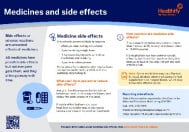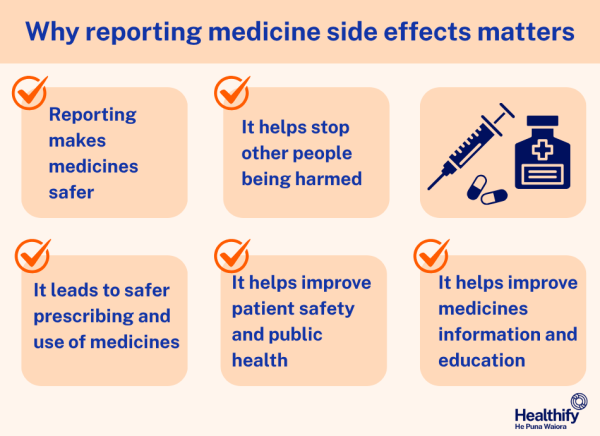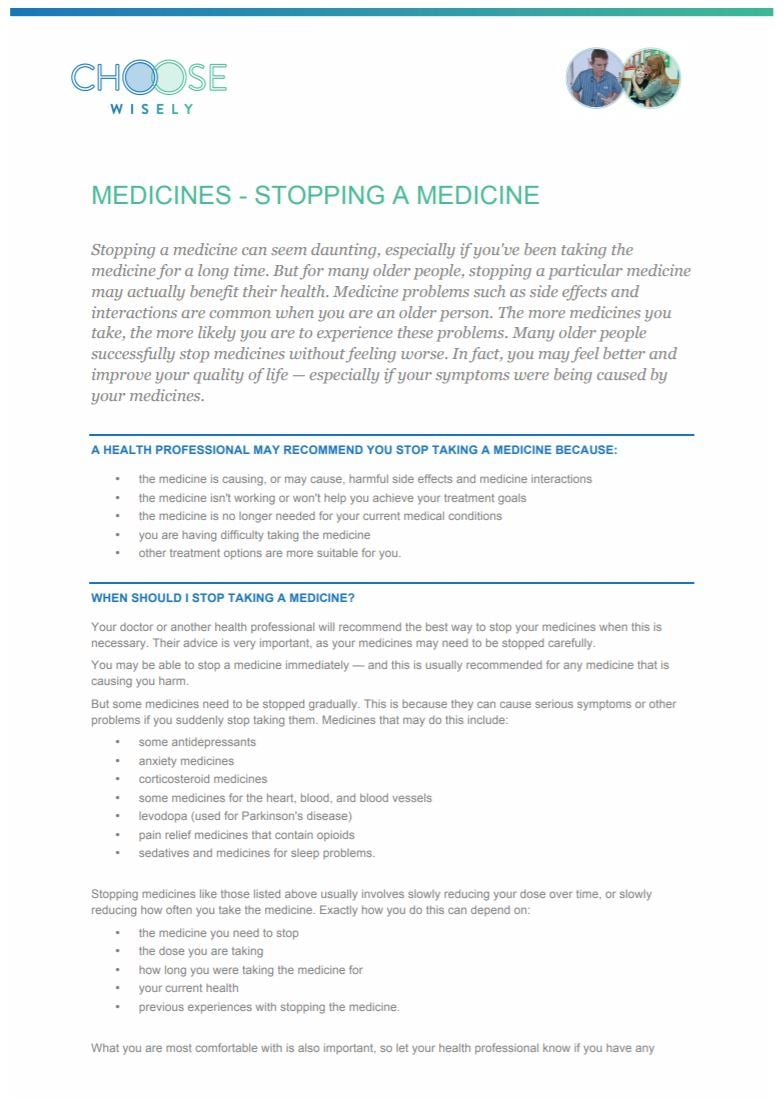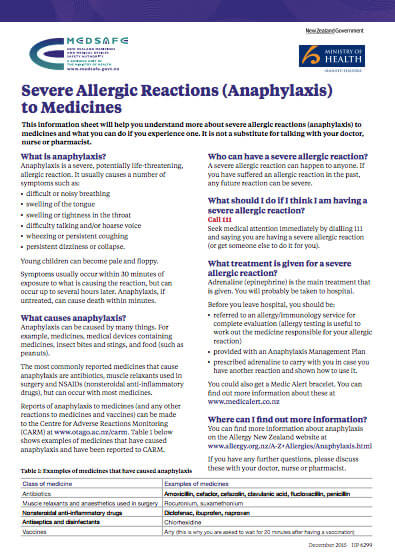You can now add Healthify as a preferred source on Google. Click here to see us when you search Google.
Medicines and side effects
Also called unwanted effects or adverse effects
Key points about medicine side effects
- Medicines are used for many health conditions. They can help you feel better, get well and even save lives. But all medicines, including prescription medicines, over-the-counter (OTC) medicines, herbal remedies, vitamins and supplements, can cause side effects.
- All medicines have possible side effects, but not everybody will get them.

Side effects, also called adverse reactions, are the unintended effects of a medicine.
Medicines are used for many health conditions. They can help you feel better, get well and even save lives. But all medicines, including prescription medicines, over-the-counter (OTC) medicines, herbal remedies, vitamins and supplements, can cause side effects.
When a medicine is recommended for you, it's important to ask questions about side effects and how they might apply to you. It's important to report any side effects to your doctor, pharmacist or nurse. Reporting side effects helps protect everyone's health.
Factsheet: Medicines and side effects

Medicines and side effects [PDF, 91 KB]
Healthify He Puna Waiora, NZ, 2024
The likelihood of experiencing different side effects varies for each medicine. Some side effects are common and others are rare. Some can be managed or prevented and some are also more serious than others. You may not experience any side effects at all.
The following terms are used to describe how likely a side effect is to occur, on average.
- Very common (affects more than 1 person in 10).
- Common (affects between 1 in 10 and 1 in 100 people).
- Uncommon (affects between 1 in 100 and 1 in 1,000 people).
- Rare (affects between 1 in 1,000 and 1 in 10,000 people).
- Very rare (affects fewer than 1 in 10,000 people).
- Not known (we don't know how many people are affected).
For example, if the risk is described as very rare (fewer than 1 in 10,000), that means 9,999 people out of 10,000 probably won't experience that side effect.
Note: Although this sort of information can give you an idea of how often side effects occur on average, it doesn't tell you how likely you personally are to experience a particular side effect.
Anyone can get side effects from a medicine, and it's difficult to know if a medicine will cause you side effects. Your risk of a side effect depends on several factors such as:
- The dose of your medicine – you are generally more likely to get side effects when taking higher doses.
- How old you are – older adults are more likely to have side effects than younger adults.
- Whether you are taking other medicines or herbal remedies that might interact with the new one.
- Other health problems you may have.
You may notice side effects when you:
- start taking a medicine
- have been taking a medicine for a while
- have a change in the dose of a medicine
- stop taking the medicine, for example some medicines need to be stopped slowly over a few weeks. Stopping tthem suddenly can cause side effects.
If you notice a new symptom that starts within hours or days of taking a new medicine, it could be that the medicine is the cause. If you have a symptom months later it could be caused by something else, but some medicines do have delayed side effects that can happen later.
Taking some medicines together may cause side effects, or make them worse. This is called an interaction.
Interactions can happen with any medicines, including over-the-counter medicines, vitamin and mineral supplements, herbal or natural remedies and even food or alcohol.
Before you take a new medicine or supplement, always ask your pharmacist about interactions with other medicines you are taking.
Talk to your healthcare provider
All medicines can cause side effects, although not everyone gets them. Often side effects improve as your body gets used to the new medicine. If you think your medicine is causing problems, talk to your healthcare provider. It's important that you find the balance between treating your symptoms and managing side effects.
- Many people find that side effects only last a few days after starting a new medicine. But, if you do have problems, talk to your healthcare provider before deciding to stop your medicine.
- Keeping a diary of side effects can help your doctor or pharmacist understand how you’ve been feeling and how long it's been going on for. This will help you to work with them to find a solution that suits you, so you can stay as well as possible. Here are a few examples of medicine side effects diaries:
- Some side effects (eg, problems with sex) might feel difficult to talk about. However, your healthcare provider will have had similar questions before and can help you find a solution. You can take a friend, relative or advocate if you find it hard to talk to your doctor on your own.
The following pages give more advice about some side effects:
- Medicines and bladder control problems.
- Medicines and falls risk.
- Medicines that affect mood.
- Medicines and sexual problems.
- Medicines and weight gain.
- Medicines and constipation.
- Medicines and movement side effects.
How can I report side effects?
If you think your medicine has caused a side effect, talk to your healthcare provider. They may be able to lower your dose or change the medicine. Don't suddenly stop taking your medicine unless your prescriber tells you to.
- It's important to let your doctor, pharmacist or nurse know about your side effects. Reporting side effects helps protect everyone's health.
- You can also report side effects yourself through Centre for Adverse Reactions Monitoring ((external link)CARM)(external link). Read more about reporting side effects.

Image credit: Healthify He Puna Waiora
Some side effects can be avoided by following specific instructions for that medicine. For example, this may include:
- starting with a low dose and increasing that dose gradually over time
- taking the medicine with meals
- taking the medicine on an empty stomach
- taking the medicine at a particular time of the day
- staying out of the sun.
The label on your medicine has important information including how much to take, how often to take the medicine and other special instructions. Learn more about medicine labels.
Knowing whether side effects can be managed may help you when deciding whether to start new medicines. When you're finding out about side effects, remember to weigh these up against the benefits of the medicine when you make any choices about treatment.
When finding out about side effects, important questions to ask your healthcare provider are:
- What are the possible side effects?
- How common are the side effects?
- Are there any serious side effects and how likely are these?
- Can I do anything to avoid or reduce the side effects?
- Will the side effect get better with time?
- What should I do if I am worried about a side effect?
Always discuss any side effects with your healthcare provider. If there are any side effects you're having trouble managing, there may be things your healthcare provider can suggest, such as reducing the dose of your medicine or trying another treatment.
Beware of unreliable information
Although you might be interested to hear about other people’s experiences with a medicine, remember that not everyone who takes the same medicine will have side effects, or have the same side effects. This is particularly important if you are searching online about your medicines. Remember that many online discussions about medicines and side effects are unreliable and may not apply to you. The best person to talk to is your healthcare provider.
The following links have more information about medicine side effects. Be aware that websites from other countries may contain information that differs from New Zealand recommendations.
Medicine and side effects(external link) NPS MedicineWise, Australia
Resources
Safe use of medicines – patient guide(external link) Waitematā DHB, NZ, 2015
Taking your medicine safely(external link) Health Quality and Safety Commission, NZ
Severe allergic reactions (anaphylaxis) to medicines(external link) Medsafe, NZ English(external link), te reo Māori(external link)
Stopping a medicine(external link) Choosing Wisely, NZ, 2016
5 questions to ask about your medications(external link) Health Quality and Safety Commission, NZ, 2019 English(external link), te reo Māori(external link)
References
- Adverse reactions to medicines(external link) Medsafe, NZ, 2019
- Medication side effects – how likely are they to occur?(external link) Sussex Partnership, NHS, UK
- Understanding the frequency and severity of side effects – linguistic, numeric, and visual representations(external link) American Association for Artificial Intelligence, US, 2006
Brochures

Medicines and side effects
Healthify He Puna Waiora, NZ, 2024

Choosing Wisely, NZ, 2016
Credits: Sandra Ponen, Pharmacist, Healthify He Puna Waiora. Healthify is brought to you by Health Navigator Charitable Trust.
Reviewed by: Angela Lambie, Pharmacist, Auckland
Last reviewed:
Page last updated:






